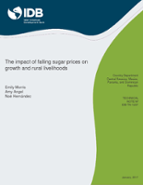The Impact of Falling Sugar Prices on Growth and Rural Livelihoods
Date
Jan 2017
Sugar is one of Belize's main export crops and an important contributor to the national economy, but the global sugar industry faces great uncertainty, with reform of the EU's sugar regime, weakening global sugar demand and competition from larger producers expected to push down prices. Most of Belize's sugar is exported to the EU, though it also sells to the US, Caricom and Fair Trade markets. The sugar-dependent northern region of the country - the Orange Walk and Corozal districts- has low agricultural yields and high handling costs, so there is scope for improving production techniques and the efficiency of harvesting methods as indicated in the industry's Strategic Development Plan. However, highly-indebted farmers will find it difficult to finance improvements and limited milling capacity are constraints. In the new capital-intensive sugar industry in the west of the country, lower sugar prices will have a far weaker impact on farmer incomes or the local economy. Official policy for the industry focuses on raising productivity and efficiency. The need for diversification is acknowledged, but this will require strengthened technical support, agricultural health services, data and marketing for alternative crops, and further development of the northern region as an 'emerging destination'. Without improved competitiveness of the sugar industry in the northern region and diversification, Belize's economy and the communities of its northern region will be vulnerable to severe difficulties in the uncertain years ahead.



